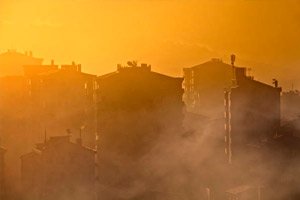
All iLive content is medically reviewed or fact checked to ensure as much factual accuracy as possible.
We have strict sourcing guidelines and only link to reputable media sites, academic research institutions and, whenever possible, medically peer reviewed studies. Note that the numbers in parentheses ([1], [2], etc.) are clickable links to these studies.
If you feel that any of our content is inaccurate, out-of-date, or otherwise questionable, please select it and press Ctrl + Enter.
Air pollution causes inflammation, mainly in patients with heart disease
Last reviewed: 02.07.2025
 ">
">A new study by cardiologists at Intermountain Health in Salt Lake City shows that patients with heart disease, especially heart failure, are particularly vulnerable to the effects of air pollution and poor air quality, and can take steps to protect themselves.
Results from the Intermountain Health study, presented at the 2024 American Heart Association Scientific Sessions international conference in Chicago, found that two inflammatory markers — CCL27 (CC motif chemokine ligand 27) and IL-18 (interleukin 18) — were elevated in heart failure patients exposed to air pollution but were unchanged in people without heart disease.
This suggests that such air pollution events place additional stress on the bodies of patients with existing heart problems.
While previous studies have shown that people with chronic conditions such as heart failure, coronary artery disease, asthma and COPD experience difficulties during spikes in air pollution, a new study from Intermountain Health shows that levels of inflammation in the cardiovascular system specifically increase in people with heart disease during periods of poor air quality.
"These biomarkers increased in response to air pollution in people with existing heart disease, but not in patients without heart problems, indicating that heart failure patients are less able to adapt to changes in their environment," said Dr. Benjamin Horn, lead researcher of the study and a professor of research at Intermountain Health.
For the retrospective study, Intermountain Health researchers, along with researchers from Stanford University and the Harvard T.H. Chan School of Public Health, examined blood from patients participating in the Intermountain INSPIRE registry, which collects blood samples and other biological materials, medical information, and lab data from both healthy people and patients with a variety of diseases.
The researchers specifically looked at blood tests for 115 different proteins that are signs of increased inflammation in the body.
They looked at blood samples from 44 patients with heart failure with preserved ejection fraction and 35 people without heart disease. Some blood samples were taken on low-pollution days, when PM2.5 levels were less than 7 micrograms per cubic meter (μg/m3) of air; the results were compared with samples taken from other people on days when air pollution levels rose to 20 μg/m3 or higher.
These pollution spikes were caused either by smoke from wildfires in the summer or by winter inversions, when warm air traps pollutants closer to the ground.
The researchers found that two inflammatory markers, CCL27 and IL-18, were elevated in patients with heart failure but unchanged in people without heart disease, suggesting that such air pollution-related events place additional stress on the bodies of patients with existing heart problems.
These data "give us information about the mechanisms of inflammation in people with heart failure and suggest that they are less able to cope with acute inflammation compared to healthy people," Dr. Horn said.
He added that the study's findings highlight the need for special care for heart failure patients during periods of high air pollution.
"It is important that people with known heart conditions, including those diagnosed with heart failure, take extra care during periods of poor air quality. This includes exercising indoors, taking prescribed medications promptly and avoiding high-traffic areas such as roads and highways where there is more traffic and pollution," he said.
